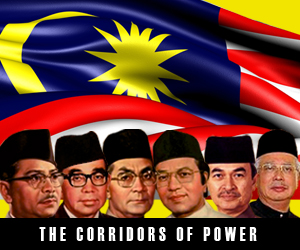Rafizi raises the bar for stupidity

Rafizi has painted two scenarios for the next general election and in both scenarios PAS is going to get totally wiped out and not win a single parliament seat. Further to that, according to Rafizi, Pakatan’s survival depends on 90% Chinese votes. In the meantime, DAP announced that PAS is not going to be part of the Selangor government after the next general election, which means DAP expects PAS to win some state seats in Selangor, contradicting Rafizi’s analysis that PAS is going to get totally wiped out.
THE CORRIDORS OF POWER
Raja Petra Kamarudin
Yesterday, PKR’s Rafizi Ramli came out with his analysis for the next general election (see the Malaysiakini report below: Survey suggests Harapan victory, PAS wipeout among GE14 possibilities). Before I could respond to what I thought was a very amateur analysis, Ibrahim Suffian a.k.a. Ben of Merdeka Centre responded first (see the Malaysiakini report below: Rafizi’s survey paints rosy picture but it’s a thorny path ahead).
I was told Selangor Menteri Besar Azmin Ali was not too pleased with Rafizi’s revelation. He, too, thought it was a silly analysis based on ‘we will win if they vote for us and we will lose if they do not vote for us’ scenario. Any idiot knows that: you will win if you get the votes but not if you don’t get the votes. What type of analysis is that?
Rafizi’s analysis comes in two scenarios: Scenario 1 and Scenario 2. In Scenario 1 the opposition would win 126 parliament seats while Barisan Nasional would win only 96 seats. In Scenario 2 Barisan Nasional would win 130 parliament seats while the opposition would win only 92 seats. So it is either 130: 92 or 96:126 Barisan versus Pakatan.

Both scenarios in Rafizi’s analysis depend on 90% Chinese votes, which means Pakatan’s survival depends on the Chinese
What is most interesting is that in both scenarios PAS is not going to win a single seat: zero seats. So what Rafizi is telling us is that PAS is not going to be a member of both coalitions — Barisan as well as Pakatan — and is going to be a solo party. In short, also, Rafizi is saying that PAS is going to get totally wiped out. Further to that, both scenarios depend on Pakatan garnering 90% of the Chinese votes. And Rafizi does not have a Scenario 3 because he is sure that Pakatan is going to get 90% of the Chinese votes.
I think Rafizi is overlooking one fact. And that one fact is PAS has about a million registered members and many more ‘silent’ members, mainly government servants who support PAS but are not card-bearing members.
In the 1999 general election PAS garnered one million votes versus DAP’s and PKR’s 800,000 votes each. In 2004 PAS increased its votes to 1.1 million versus DAP’s 700,000 and PKR’s 600,000. In the 2008 ‘Chinese Tsunami’, PAS still garnered 1.14 million votes versus PKR’s 1.5 million and DAP’s 1.1 million. In 2013, PAS won 1.6 million votes versus PKR’s 2.2 million and DAP’s 1.7 million.
So how can you assume that PAS is going to get zero seats when it has consistently maintained its voter base of one million? In the 2009 by-election in Kuala Terengganu, PAS won that parliament seat. They won it again in the 2013 general election. And Kuala Terengganu can be considered an urban seat although located in the East Coast. In the real rural seats the PAS supporters are diehards and do not switch parties that easily.
Even if Pakatan can really steal 38% of the PAS votes it will not be across the board like Rafizi suggests but will be in pockets. It is not going to be consistently 38% in every single seat, something that Rafizi does not seem to realise.

PAS supporters are hardcore, not like Pakatan Harapan and Pribumi supporters
Anyway, this looks like Rafizi’s weak attempt at playing the psywar game. If this is his best psywar strategy then he needs another few years to master that game before he comes out with his so-called election analyses like the one he did yesterday. Even if you are attempting psywar you have to make it believable. If not then you will begin to lose credibility, not that Rafizi has much to start with.
The Kajang Move is just one example of a failed psywar game. That one fiasco alone destroyed his credibility. Then Rafizi came out with one spin after another and all ended up in crash and burn. Yesterday’s election analysis ‘disaster’ made even Azmin cringe in pain.

Azmin Ali now has to deliver an impossible and unrealistic target
Actually Azmin and not Rafizi should have been the one to issue this statement. After all Azmin is the one who has to deliver whatever Rafizi promised the voters (which is PAS is going to get wiped out and will not win a single seat in the next general election).
Rafizi has raised the bar and Azmin now has to jump over that impossibly high bar and most likely break his neck in the attempt. Is Rafizi setting Azmin up for a fall? PAS needs to get totally wiped out in the next general election. There is no way PAS can be allowed to win even a single seat. If not Azmin would be seen as a failure. So, if PAS ends up winning 20 or 30 seats, then Azmin needs to be crucified upside down and left to die.
Hmm…maybe Rafizi is not so stupid after all as we thought. Maybe his real target is not PAS but Azmin. Is Rafizi setting an impossible target that he knows Azmin cannot achieve just so that Azmin’s chances of going against Dr Wan Azizah Wan Ismail in the next party election would diminish? Going by what he initially said about the Kajang Move, Rafizi could actually be saying one thing but trying to achieve another.
**************************************************

Survey suggests Harapan victory, PAS wipeout among GE14 possibilities
(Malaysiakini, 19 Jan 2017) – Pakatan Harapan and Parti Pribumi Bersatu Malaysia (Bersatu) forming the next government is one of several potential outcomes, according to a preliminary survey by PKR vice-president Rafizi Ramli’s Invoke Centre for Policy Initiatives (I-CPI).
In this scenario, an I-CPI simulation found that Harapan and Bersatu would win 126 parliamentary seats, BN 96, while PAS would win zero seats.
However, this outcome is dependent on several factors, namely, that half of those who did not vote in the previous election cast their ballots; Chinese voter support for the opposition coalition is at GE13 levels; and that they can win over 38 percent of PAS supporters.
If Chinese support is at GE13 levels, but non-voting percentages and PAS support remain the same, then BN would win the election with 130 seats, Harapan and Bersatu 92 seats, and PAS zero.
**************************************************

Pollster: Rafizi’s survey paints rosy picture but it’s a thorny path ahead
(Malaysiakini, 20 Jan 2017) – The survey by PKR vice-president Rafizi Ramli’s Invoke Centre for Policy Initiatives (I-CPI) painted a positive picture for Pakatan Harapan, but omitted certain realities, says pollster Ibrahim Suffian (pic).
“He (Rafizi) talked about what they (Harapan) needed in order to win, but then there are the things he did not say, which is the status quo.
“It’s omitting the elephant-sized reality that Pakatan Harapan cannot win over enough Malays to challenge BN,” Ibrahim told Malaysiakini today.
This reality had already played out during the double by-elections last year, in Sungai Besar and Kuala Kangsar, he said, and the I-CPI survey results mirrored what happened in the by-elections.
Rafizi’s I-CPI yesterday released the results of their preliminary survey and they ran simulations that predicted the opposition coalition may win the next election.
However, this outcome depended on several factors, namely that half of those who did not vote in the previous election cast their ballots in favour of Harapan; Chinese voter support for the opposition coalition is at GE13 levels; and that they can win over 38 percent of PAS supporters.
Ibrahim, who is Merdeka Center programme director, said these assumptions I-CPI had put up in order for the opposition coalition to win showed that it was going to be an uphill task for Harapan without PAS.
“So many ‘ifs’ need to be fulfilled in order to achieve their goal.
“With the time, the resources, the leadership they have, are they able to move large numbers of people to switch over to their side?
“If they are not able to do that, which the likelihood is fairly high, why can’t they compromise on issues they can work together with PAS?” he questioned.
Ibrahim explained that voters had political affiliations that were built over the years with their chosen party.
Affiliations cannot be bought and sold
These political affiliations cannot be bought and sold like goods in a store, he said.
“The hardcore PAS voters remain loyal to their party and they are quite a sizeable chunk of the electorate.
“PAS is an old party, it’s been around for 60 years, and it’s a cradle-to-grave type of party,” he pointed out.
The only way Harapan can hope to sway PAS voters their way, Ibrahim said, is for them to offer the voters something completely new and interesting.
Harapan’s biggest challenge, he said, is to accept the reality that they are not as popular among Malays as PAS and that they have not offered sufficient reason for PAS voters to swap parties.
“They have two choices, either to carry on and fight in three-cornered fights and lose, or find it within themselves to reach a compromise with the Islamic party.
“The best bet is for them to find a way to work together (with PAS), otherwise they are all going to lose,” he said.
Though he could not say for certain whether the I-CPI survey is scientific, as he does not know their methodology, he said it is a meaningful and sobering survey.
“I think it is a meaningful survey that should not be dismissed, it is a sobering survey.
“It does provide useful information for political parties to think about where they want to go next.
“If I was BN, I would work doubly hard to make sure the opposition remains split,” Ibrahim said.

